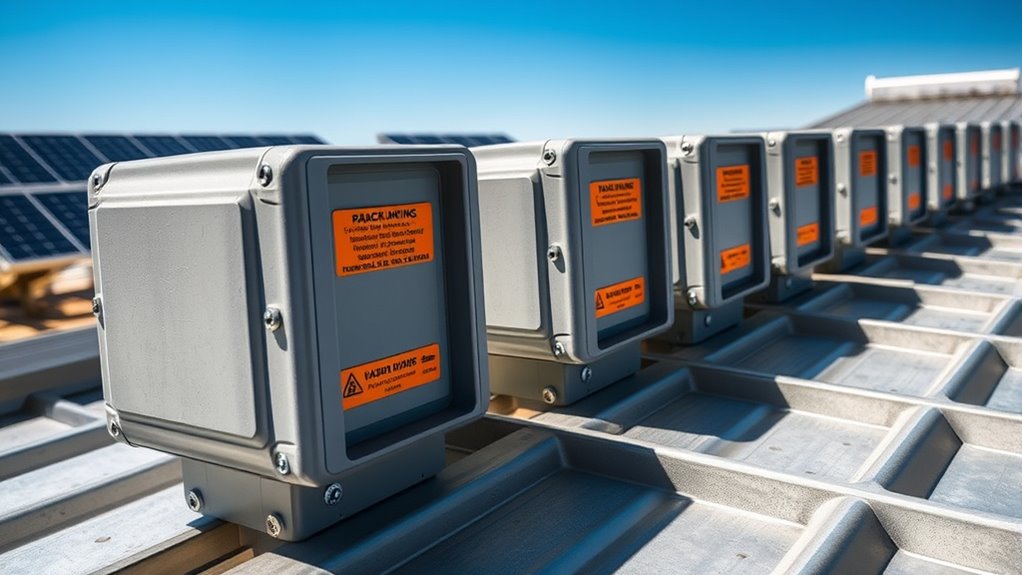To guarantee electrical safety with solar junction boxes, you should focus on proper design features like insulating barriers, grounding terminals, and surge protection. Regularly inspecting and testing insulation resistance helps prevent faults, shocks, and fires by catching deterioration early. Ground fault protection devices quickly disconnect affected circuits when faults occur, maintaining system safety. Keeping these safety measures in place is essential for reliable operation, and exploring further will reveal how to implement these practices effectively.
Key Takeaways
- Ground fault protection in junction boxes prevents electric shocks and equipment damage by quickly disconnecting faulty circuits.
- Proper insulation resistance ensures safety by preventing current leaks and short circuits within the junction box.
- Regular insulation resistance testing detects deterioration early, maintaining system safety and preventing potential hazards.
- Design features like insulating barriers, surge protection, and grounding terminals enhance overall electrical safety.
- Routine maintenance and testing uphold insulation integrity and functionality of safety features, ensuring long-term system reliability.

Have you ever wondered how solar junction boxes guarantee the safety and efficiency of your solar power system? These small but indispensable components play a pivotal role in protecting your system from electrical hazards while guaranteeing peak performance. One of the key safety features they provide involves managing ground faults. A ground fault occurs when an unintended electrical connection develops between the live parts of your solar system and the ground. If left unchecked, it can cause electric shocks, equipment damage, or even fires. Solar junction boxes are designed with protective devices that quickly detect such faults and disconnect the affected circuit, preventing dangerous situations. This rapid response is essential for maintaining safety and minimizing potential damage to your system.
Solar junction boxes swiftly detect ground faults, ensuring safety and preventing damage in your solar power system.
In addition to ground fault protection, insulation resistance is another critical aspect that solar junction boxes address. Insulation resistance refers to the measure of how well the insulating materials prevent current leakage between conductive parts and the ground. Over time, environmental factors like moisture, dirt, or physical wear can compromise insulation resistance, increasing the risk of electrical leaks that could lead to short circuits or electric shocks. Solar junction boxes incorporate high-quality insulation materials and robust sealing mechanisms to maintain their insulation resistance over the lifespan of your solar system. This guarantees that electricity flows only through the intended pathways, reducing the chance of dangerous leaks or system malfunctions. Properly maintaining insulation resistance is vital for the overall longevity and safety of your solar installation.
When your solar system is properly housed in a well-designed junction box, it also benefits from insulation resistance testing. This test verifies that the insulation remains intact, which is essential for long-term safety. Regular inspections and testing help catch any deterioration early, allowing for timely repairs or replacements. In essence, the junction box acts as a barrier, containing the electrical components and safeguarding against potential faults that could jeopardize your safety or system performance.
Furthermore, the design of solar junction boxes often includes features that enhance insulation resistance and ground fault protection, such as insulating barriers, surge protection devices, and grounding terminals. These elements work together to create a thorough safety net. By ensuring that the ground connection is solid and that insulation properties are maintained, the junction box helps you avoid dangerous shocks and system failures. This combination of ground fault detection and insulation resistance management makes sure your solar power system operates safely, efficiently, and reliably over many years. Regular inspection and testing are essential practices to ensure these safety features continue to function properly throughout the system’s lifespan.
Frequently Asked Questions
How Do Junction Boxes Prevent Electrical Fires?
Junction boxes prevent electrical fires by ensuring overcurrent protection and proper grounding. You should check that circuit breakers or fuses are correctly rated to handle the current, preventing overheating. Additionally, make sure the box is properly grounded to avoid electrical faults that could spark fires. Regular inspections and using quality junction boxes help maintain safety, reducing the risk of electrical fires caused by short circuits or overloads.
Are Junction Boxes Suitable for Outdoor Solar Installations?
You can confidently use junction boxes for outdoor solar installations, as they’re designed for harsh environments. These boxes guarantee solar panel compatibility and protect your system from weather elements. Proper junction box installation is vital to prevent electrical issues and maximize safety. Don’t overlook this step; a well-chosen, weatherproof junction box keeps your solar setup safe, reliable, and efficient, giving you peace of mind while harnessing the sun’s power.
What Materials Are Best for Solar Junction Box Construction?
You should choose materials like die-cast aluminum or UV-resistant plastics for your solar junction box. These materials offer excellent durability and corrosion resistance, ensuring your system withstands outdoor elements. Aluminum is lightweight and highly durable, while UV-resistant plastics prevent degradation from sunlight. Selecting high-quality materials helps protect your electrical connections, prolongs the lifespan of your junction box, and maintains system safety and efficiency over time.
How Often Should Junction Boxes Be Inspected for Safety?
Imagine sunlight glinting off your panels as you check your junction boxes; you should inspect them at least once a year. Regular inspection frequency helps you catch potential safety issues early, like loose connections or corrosion. Prioritizing safety considerations guarantees your system operates efficiently and safely. Don’t wait for visible signs of trouble—annual inspections keep your solar setup reliable and safeguard your investment over time.
Can DIY Installations Meet Safety Standards for Junction Boxes?
Yes, your DIY installation can meet safety standards if you follow proper procedures and local regulations. To guarantee safety, research DIY safety guidelines thoroughly, use high-quality materials, and adhere to installation standards. It’s also wise to consult any relevant electrical codes and consider having a professional inspect your work. Proper planning and attention to detail help your DIY junction box installation stay safe and compliant with industry standards.
Conclusion
So, next time you admire your solar setup, remember the humble junction box. It’s the hero quietly preventing shocks and fires, yet often overlooked. Ironically, the very safety feature you rely on is so small and simple, it’s easy to overlook its importance. Without it, your solar dreams could quickly turn into a shocking nightmare. Stay vigilant, guarantee proper installation, and give that tiny box the respect it deserves—you’ll thank yourself later.









